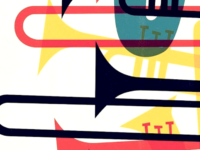Three recent efforts demonstrate the vitality and variety of the big band, however big it is – or isn’t:
Dan Bonsanti’s 14 Jazz Orchestra – three trumpets, two trombones, four reeds, four rhythm, and Bonsanti – takes on contemporary jazz tunes by modern composers on Cartoon Bebop. They include Chick Corea, Stanley Clarke, Herbie Hancock, Wayne Shorter, and two by Bonsanti bookending the album.
He’s played with everybody from Dionne Warwick and Dolly Parton to the Brecker Brothers, Bob James and Jimmy Cobb, as well as the big bands of Doc Severinsen and Stan Kenton. He played in Jaco Pastorius’s Word of Mouth and wrote arrangements for the its descendant, the Jaco Pastorius Big Band. So the guy knows his stuff. And yes, despite the name of his new album, Bonsanti takes his music seriously. He’s just not afraid to show a sense of humor as well.
Take the title tune of Cartoon Bebop, which kicks off the recording. Dan Bonsanti wrote it after seeing the Geico insurance commercial featuring Rocky and Bullwinkle alongside the spot’s nominal star, the gecko. The use of piccolo and tuba is intended to reference the popular cartoon pair, but what’s more important is that the tune simply works. The riffs by all the sections mesh well together, leading into a solo by Ed Calle on tenor, who is featured throughout the disc, as well as Jason Carder on trumpet and Ed Maina on alto (more on Maina later).
Airto Moreira’s “Misturada” follows, again showcasing Bonsanti’s flair for somewhat non-traditional instrumentation. Flutes abound: In addition to their holding forth on various saxophones, Maina is credited on alto flute, Tom Timko on flute, Peter Brewer on bass clarinet and flute, and Bonsanti’s brother Neil on oboe, English horn, clarinet and flute.
Stanley Clarke’s “Dayride” pushes toward a fusion sound, which makes sense, given its birth on Return to Forever’s No Mystery. In contrast, “I’m All Smiles” is a gently swinging respite, again with the emphasis on flutes and woodwinds.
Things get really interesting on the Chick Corea burner “Got a Match.” Calle opens with a scorching tenor solo, followed by a piccolo solo (!) by Maina. Then bassist Nicky Orta takes a ride, Calle chimes in, then Maina again – all separated by Lee Levin’s drums.
That may be a high point, but there are more: the gorgeous woodwinds and muted brass of “Driftin,’” “Wood Dance” again with the flutes, Corea’s “Duende” with English horn (yup), and the nearly zany closer, a mashup of the Beatles “Day Tripper” with a Dan Bonsanti original, the entirety called “A Day Tripper Blues Buffet.” All told, it’s a tuneful, tasteful, thoroughly enjoyable trip.
Now, another trip, this time to Germany, for the question, “What do you get when you combine techno beats, repetitive motifs a la Steve Reich, flashing strobe lights, spoken word, a rousing horn section, and a hot electric rhythm section?” The answer: The young German assemblage, Jazzrausch Bigband.
The presence of contrabass clarinet, tuba, electric keyboards and laptop should clue you in: This is not your father’s big band. The various musical colors would have appealed to Gil Evans and Duke Ellington, while Maynard Ferguson would have appreciated the power. But the repetitive beats and static chords likely wouldn’t have pleased them, nor adherents of the classic big-band approach.
But that’s the point. This is a band by and for a new generation, and if that’s what it takes to bring younger fans into the fold, well, so be it. Jazzrausch Bigband has sold out rock and classical venues alike, and played everywhere from festivals in Germany to Lincoln Center in New York to SXSW.
Techné is the eighth recording by the group, led by trombonist Roman Sladek and guitarist and composer Leonhard Kuhn. The opening “Mosaique Bleu” aptly demonstrates its appeal. Think Snarky Puppy with a French-speaking female vocalist/narrator. Sladek takes an engaging solo that never loses the listener’s interest.
“Ai 101” sounds suspiciously like Philip Glass at first, before the German vocals and backing bring in Kraftwerk. The way the repeated riffs by the horns intersect again on “Make Craft Perform” suggests the minimalist composers, but they typically don’t feature star trombonist Nils Landgren.
“Green Sun” showcases muted trumpets against low brass, with synths straining to break free. A saxophone solos against the dense mix, then gets mournful when most of the other instruments drop out. Wordless vocalizing takes you to the end.
By this point, the strict rhythms begin to wear on your typical big-band fan, but apparently not on the kids. In fact, Jazzrausch Bigband became artist in residence at the Harry Klein, one of the most renowned electronic music clubs in Europe.
No doubt in-person performance (remember those?) helps get across the group’s enthusiasm and energy. That’s apparent from even a quick viewing of Jazzrausch Bigband’s live videos on Youtube. But without that, ears weaned on Basie and Mingus, even the Brian Setzer Orchestra, may tire by the end of Techné.
For the adventurous, however, tunes like “Mosaique Bleu,” “Hurricane Ride,” with its insistent trumpets, and “Shuffling Steps” will have your toes tapping. And there can be no doubting the musicality of the group as it navigates the multiple twists and turns.
If your big band preferences hew more toward tradition than upending it, the new release from the Grand Rapids Jazz Orchestra might be just the ticket. It features the traditional complement of players – five saxophones, four trumpets, four trombones plus rhythm. Like Cartoon Bebop, it was recorded discretely by the band members from their home studios. Hence the album’s title, Behind the Mask.
But traditional doesn’t mean staid or boring, and the variety of this disc is its greatest strength. “Morning Star” is a moody feature for Matt Sumner on flugelhorn. His rich, burnished sound melds well with the woodwinds and muted trumpets. The Latinesque “Pontaluna” gives Greg Marsden on tenor and composer Sumner plenty of room to roam.
“Fanfare for an Uncommon Man” is based on the rocking version of Aaron Copland’s “Fanfare for the Common Man” cooked up by Emerson Lake and Palmer. Saxophonist and arranger Bob Nixon admits ELP was a favorite of his during his college years, and the Grand Rapids Jazz Orchestra makes the tune its own, giving it a swing it never previously boasted. The skirling sax solo is a new addition, while Steve Talaga’s organ solo echoes the signature stylings of Keith Emerson on keyboards, segueing as it does into Copland’s “Hoedown,” also an Emerson Lake and Palmer favorite.
Another popular tune from that era was “Europa.” Written by Carlos Santana and his keyboard player at the time, Tom Coster, it also became a hit for Argentinean saxophonist Gato Barbieri. On Behind the Mask, Jim Hayward takes the solo sax spotlight, with muted brass and flutes aplenty backing him. While Barbieri was famous for his grainy, crying sound, Hayward’s tone is more liquid. The backgrounds are exquisite.
Robin Connell’s “Wiggle Worm” is derived from an unlikely source: a friend’s cassette of children’s songs. Here pianist Talaga takes the spotlight first, followed by Paul Brewer on trombone and co-leader Tim Froncek on drums. It’s on the concluding “Bob the Bopper” the Grand Rapids Jazz Orchestra is at its most kaleidoscopic. Composer Brewer plays off his fellow trombonists and the sweet sax section, capping off an engaging album.
- Jon Anderson, Reza Khan, CSNY + Others: Ross Boissoneau’s Best of 2024 - December 30, 2024
- Tower of Power, Jennifer Hudson, Ben Folds + Others: 2024’s Seasonal Sounds - November 25, 2024
- Dave Bainbridge of Downes Braide Association: The Albums That Shaped My Career - October 9, 2024



